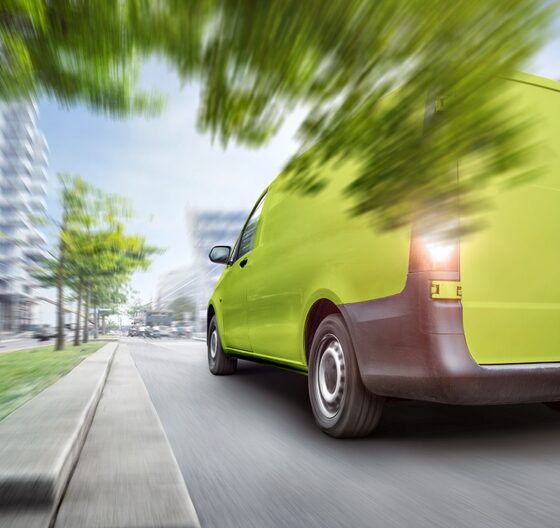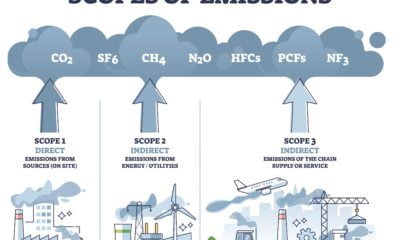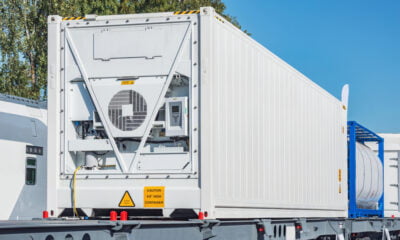

Environment
The Future of Sustainability In The Logistics Industry
Sustainability in the modern era is a political, social, and economic imperative. It’s simply not possible to continue extracting energy and other raw materials from a finite planet in the long run – this much is painfully clear.
That being said, it’s important that we have some kind of concrete idea of what sustainability will actually look like. In the logistics industry, an area with a historically high environmental impact, these issues are even more crucial to address. Let’s explore where we’re headed.
Reducing transport emissions
Transportation is a crucial aspect of our daily lives, but it also contributes significantly to greenhouse gas emissions and air pollution. As societies become more aware of the environmental impact of transportation, efforts are being made to reduce these emissions and create a more sustainable future.
One effective strategy to tackle transport emissions is promoting the use of alternative modes of transportation. Encouraging people to walk, cycle, or use public transport not only reduces the number of vehicles on the road but also leads to improved air quality and reduced congestion. Investing in infrastructure that supports these alternative modes of transportation, such as bike lanes and pedestrian-friendly streets, can make these options more accessible and attractive to people.
Another approach to reducing transport emissions is the adoption of electric vehicles (EVs). EVs have the potential to significantly reduce greenhouse gas emissions, especially when paired with renewable energy sources for charging. Governments and organizations are implementing various incentives and subsidies to make EVs more affordable and appealing to consumers, thus accelerating the transition to a cleaner transportation system.
Furthermore, smart city initiatives are gaining traction around the world. These initiatives utilize technology and data to optimize transportation systems, reducing congestion and emissions. Intelligent traffic management systems, real-time public transport updates, and carpooling applications are just a few examples of how smart city solutions can improve efficiency and encourage sustainable transportation choices.
It is worth noting that reducing transport emissions requires a comprehensive and multi-faceted approach. Collaboration between governments, businesses, and individuals is crucial to implementing sustainable transportation policies and practices. By working together, we can pave the way for a greener future, with cleaner and more efficient transportation systems that benefit both the environment and our well-being.
Remember, every small step towards reducing transport emissions counts. From carpooling with colleagues to using public transport, or even opting for a leisurely bike ride, each choice brings us closer to a cleaner and more sustainable planet.
Alternative last-mile delivery solutions
The final leg of the delivery process is often one of the most inefficient, and as a result, the area in which we can expect to see the most promising advances. While, as mentioned, we’ve already seen the widespread introduction of EVs in this area, we can also expect a range of other alternative solutions.
This includes the use of electric cargo bikes and drones, among other things. By adopting as many alternative solutions as possible, logistics providers can play around with potential optimizations and work out which one is most effective given their specific challenges.
Efficient warehouse solutions
While transport is an issue that needs tackling, logistics providers also need to work on enhancing the sustainability and efficiency of warehouse distribution processes. By using automated loading systems from providers such as Joloda Hydraroll, logistics providers can dramatically improve efficiency in these areas, with a number of positive effects.
Not only will it decrease the reliance on human operatives and with it, the risk of injury in warehouse environments, but these systems can also make the loading and unloading of lorries a lot quicker, minimizing the number of vehicles that need to be at your warehouse at any one time.
Optimized planning
Finally, we can expect to see logistics providers adopt increasingly capable planning and analytical software. Often powered by advanced artificial intelligence, these tools can provide optimized route planning based on live data, helping to cut emissions and save drivers time while out on the road.
These tools are currently being advanced at an unbelievably rapid pace, making it difficult to predict where we’ll be in even one or two years’ time. What we can expect, however, is to see increasingly applicable solutions that help the logistics industry minimize waste while boosting sustainability.
As we can see, the future of sustainability in the logistics industry is bright. We’re seeing a range of applicable technological solutions hit the market, from artificial intelligence analytic software to highly capable EVs. Over the coming years, we can expect to see increasingly promising solutions to a range of issues, ensuring that logistics remains able to cater to changing industry demands.


 Environment12 months ago
Environment12 months agoAre Polymer Banknotes: an Eco-Friendly Trend or a Groundswell?

 Features11 months ago
Features11 months agoEco-Friendly Cryptocurrencies: Sustainable Investment Choices

 Features12 months ago
Features12 months agoEco-Friendly Crypto Traders Must Find the Right Exchange

 Energy11 months ago
Energy11 months agoThe Growing Role of Solar Panels in Ireland’s Energy Future




























